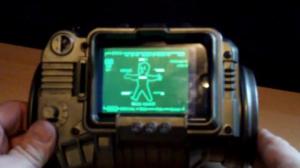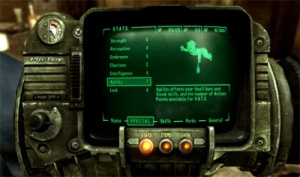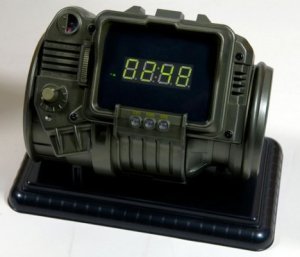Posts Tagged ‘Fallout 3’
2 November 2009

I just can’t win.
I’ve been dying to get finished with Fallout 3 for AGES. At about eighty-five hours in, I finally completed the main storyline, not to mention every single trophy-granting mini-quest. This was going to be the game that finally earned me that elusive Platinum Trophy. But for some reason or another, my “Scientific Pursuits” award never registered. Aggravating, but what the hell, right? Not like this game hasn’t earned another five or so hours of my time. Seemed as if I might as well go ahead and wrap things up, then start a new character for the Achievement.
So I pushed through the final narrative-driving bits, albeit feeling a little frustrated. I was resenting the fact I’d need to start again in order to earn this meaningless recognition that I’d become hopelessly obsessed with. And, once I’d finally completed the game, there was this hollow feeling haunting me. But it didn’t stem from what you might expect. Rather than lamenting my trophygrubbing ways, I’m convinced that I was just bummed to be supposedly “done” with Fallout 3.
(more…)
Tags:Bethesda Game Studios, Bethesda Softworks, Fallout, Fallout 3
Posted in entertainment, gaming, Microsoft Xbox 360, observation, Sony PlayStation 3 | Leave a Comment »
21 September 2009

My looord! I’ve been trying demos or fiddling with web games for probably six weeks straight. Next week, I’ll likely be able to get back to being thoughtful about games. Probably I’ll try to determine whether my demo-playing experiences can be culled for any insight as to what makes a given demo great. Below, you’ll find my thoughts on the final five demos I had yet to play.
(more…)
Tags:Atari, Bethesda Game Studios, Bethesda Softworks, Columbia Pictures, Don King, Donatello, EA, EA Black Box, EA Canada, EA Sports, Electronic Arts, Fallout 3, Fight Night, Fight Night Round 4, George Foreman, George Plimpton, Katamari Damacy, Katamari Forever, Keita Takahashi, Konami, Leonardo, Michelangelo, Microsoft Game Studios, Muhammad Ali, Namco, Namco Bandai, Norman Mailer, Raphael, Red Fly Studio, Skate, Sony Computer Entertainment, Starbreeze Studios, Team17 Software, Teenage Mutant Ninja Turtles, Teenage Mutant Ninja Turtles: Turtles in Time, Teenage Mutant Ninja Turtles: Turtles in Time Re-Shelled, Terminal Reality, TMNT, Ubisoft, Ubisoft Singapore, When We Were Kings, Worms, Zen Studios
Posted in Apple iPhone, Apple iPod touch, Demonstration Nation, entertainment, gaming, Microsoft Xbox 360, Nintendo DS, Nintendo Wii, PC, Sony PlayStation 2, Sony PlayStation 3, Sony PlayStation Portable | 2 Comments »
29 June 2009

I’ve been playing Fallout 3 for a solid forty-eight hours now. That’s TWO FULL DAYS of my life. Neither of which I want back. In fact, I’d gladly give two more. I’m practically begging for the chance.
Over the past several days, I’ve caught my brain whining. It’s been a tough week or so…all stick and no carrot. Every time some minor thing’s come along to add strain, I’m hearing myself say Ugh! I just want to play Fallout 3.
The whole sequence reminds me of Dante’s refrain in Clerks. He’s forever trying to retreat from his day as it continues to escalate in general weirdness and absurdity. Which is exactly what I’m crying out for — a little escape from my stressors. But I want that break delivered in a very particular way. One that isn’t, in fact, all that relaxing.
So why would I rather be there than here? Because games are sometimes little more than work made rewarding.
When you’re playing, the carrot’s not always just out of reach.
Tags:Bethesda Game Studios, Bethesda Softworks, Clerks, Fallout 3, Kevin Smith
Posted in film, gaming, observation | Leave a Comment »
15 June 2009

Over the past two weeks on mashedmarket, I’ve been scrutinizing Fallout 3’s sometimes counter-intuitive and quirky Pip-Boy 3000. This will be the final post in that little series. It won’t, however, mark the end of my writing about design, which has been weirdly inspiring. Expect to see more such work here in the future. As always, thanks for stopping by, and feel free to share your thoughts or otherwise drop a line.
When building Fallout 3, Bethesda set out to “create an interface…that was functional, unique and entertaining” by melding its menu system to “an important object in-game.” The series’ classic Pip-Boy (now a Model 3000) is worn on your avatar’s left wrist and manages everything from radiation levels to radio stations. Want more protection from that Radroach charging toward you? Just pull up your 3000 and change clothes. Too much stuff in your backpack? Only check on your Pip-Boy and toss some out. Need a snack? Simply glance to your P-B3 and eat some Fancy Lads. But while marrying object and interface in this way is exciting, it’s also quite a challenge.
For starters, the Pip-Boy’s very shape is troublesome: when you get to thinking about the device’s actual knobs and switches being operated by hand, it becomes difficult to concede the abstractions necessitated by controller operation. What’s more, you might start wondering why the 3000 isn’t worn on one’s other wrist, since, given the way that the dial and scroll wheel are oriented, it’d be hard to operate at left without your right hand obscuring the tiny television. Of course, these are pretty trivial details. Much more important are Bethesda’s own criteria for success. Their design diary was written during development, but notes that
The hopeful end result is that when the player activates the Pip-Boy, immersion isn’t disrupted. He hasn’t stopped playing the game in order to check something in a menu. But rather, his character has simply paused and looked down to fidget with his personal analog assistant for a moment, still in the wasteland.
Unfortunately, this isn’t quite how it feels with the final product. In fact, your 3000 is practically a pause screen. So what could change that might help create a sense of uninterrupted play?
(more…)
Tags:Bethesda Game Studios, Bethesda Softworks, Dead Space, EA, EA Redwood Shores, Electronic Arts, Fallout, Fallout 2, Fallout 3, Insult Swordfighting, Mitch Krpata, Pip-Boy, Pip-Boy 3000, V.A.T.S., VATS, Vault-Tec Assisted Targeting System, Visceral Games
Posted in constructive criticism, gaming, Microsoft Xbox 360, PC, Sony PlayStation 3 | 1 Comment »
8 June 2009

Last week on mashedmarket, I started thinking about the minor shortcomings of Fallout 3‘s amazing Pip-Boy 3000. This and next Monday, I’ll be detailing how Bethesda might alter that device’s versatile but labyrinthine interface in order to improve players’ interactions with the game. I’m no seasoned pro, but it’s been fun exercising my design sensibilities. Here’s hoping you enjoy what I’ve come up with. Thanks for reading, and please feel free to comment!
Fallout 3 is an innately convoluted ecosystem of emergent complexity in which manifold player choices create a feeling of agency, but also give way to some unforeseen situations. Want to carry that armor back to Megaton and make a sale? Crap — too heavy. Feel like a nice long nap to heal your crippled limbs? Tough luck — that’s not your bed. Hoping to talk your way out of running an errand? Not gonna happen — you’ve got low charisma and a gun in your hand.
When players roam the Capital Wasteland, all kinds of seemingly tiny decisions wind up effecting what happens. As Bethesda notes in their unusually revealing design diary, the key to navigating this overwhelmingly intricate system of choice and consequence is
Pip-Boy, a classic element of the [Fallout] series that exists as both an important object in-game as well as the player’s primary method of interacting with his character.
The 3000 is, indeed, a great tool, and, as a menu system, it does just about everything right. However, as I hinted in my last post, it’s this uneven relationship between the menus and the device itself that causes player problems. To put it another way, the Pip-Boy 3000 is an interface first and a contraption second, but it should be acting as both simultaneously in order to maximize gamer immersion.
(more…)
Tags:Bethesda Game Studios, Bethesda Softworks, Fallout, Fallout 2, Fallout 3, Pip-Boy, Pip-Boy 3000
Posted in constructive criticism, gaming, Microsoft Xbox 360, PC, Sony PlayStation 3 | 2 Comments »
1 June 2009

In an old “Design Lesson 101” post over at the ever-insightful Design Rampage blog, Raven Software Game Designer Manveer Heir contends that
Fallout and Fallout 2 use choice and consequence to deliver a world of enormous opportunities to the player and give the player agency over the type of character they develop.
I never played those first two games, but I’ve just begun Fallout 3, and I can attest that Bethesda’s first entry in the series is no exception to that legacy of choice, consequence, and agency. Options are EVERYWHERE in Fallout 3. Want to play first-person perspective, or third? Ewww, better change that outfit; turns out you look awful goofy in a sheriff’s costume. Now that you’re dressed, what about quests? Feel like wiping Megaton off the map? How about turning the settlers of Arefu against The Family? Or maybe you want to try rescuing some hapless folks from a band of Super Mutants, instead?
The flood of available choices is seemingly endless. And, to manage these, players use the handy-dandy Pip-Boy 3000. Fortunately, this wondrous little device is (more or less) up to the task.
(more…)
Tags:Bethesda Game Studios, Bethesda Softworks, Design Rampage, Fallout, Fallout 2, Fallout 3, Manveer Heir, Pip-Boy, Pip-Boy 3000, Raven Software
Posted in constructive criticism, gaming, Microsoft Xbox 360, PC, Sony PlayStation 3 | 2 Comments »
25 May 2009

I rather enjoyed Out of the Game‘s fifth podcast, which dealt with fandom and its effects on various franchises. The discussion seemed to have been spurred by Star Trek‘s recent reimagining, but meandered into the Matrix, Gotham City, and even a bit of 007’s territory. But what struck me most was the overwhelming influence that a rabid fanbase can wield when the object of its affection is a video game.
Video games, it seems to me, are uniquely beholden to their fan communities. The Out of the Game guys mentioned hardcore gaming fans in conjunction with Fallout 3 and perhaps a few other titles, but didn’t delve too deeply into the subject. Mostly, they discussed the expectations that arise when films develop the kind of cult following that exhibits slavish devotion to early entries in a given series. When this sort of anticipation isn’t met (or is otherwise subverted), the resultant outcry can be deafening. Unfortunately, with games, the roar of protest is magnified by the fact that fan groups often engage their chosen product on a weekly or even daily basis.
With movies, it’s a question of sights, sounds, and internal consistency. Games have to meet these very same expectations, but they also have to nail feel. The experience of play has to remain faithful, both in terms of controls and mechanics. Even a minor change (such as the deletion of a weapon wheel), can result in tremendous developer pressure from the fan community. What’s worse, this kind of coercion strikes me as particularly stifling when considered in light of game design’s high development costs, all-important profit imperative, and inherently iterative nature.
Of course, fans are also a wonderful thing in that they offer valuable, honest feedback and sometimes even provide vibrant, creative modifications. Fan communities certainly deserve to be rewarded for their devotion. And, paradoxically, sometimes the best way to keep their faith is by offering surprises in the form of potentially risky franchise alterations.
Just make sure and run it by them first.
Tags:007, Bethesda Game Studios, Bethesda Softworks, Fallout 3, Gotham City, Jeff Green, Luke Smith, Matrix, N'Gai Croal, Out of the Game, Robert Ashley, Shawn Elliott, Star Trek
Posted in entertainment, film, gaming, observation | Leave a Comment »






